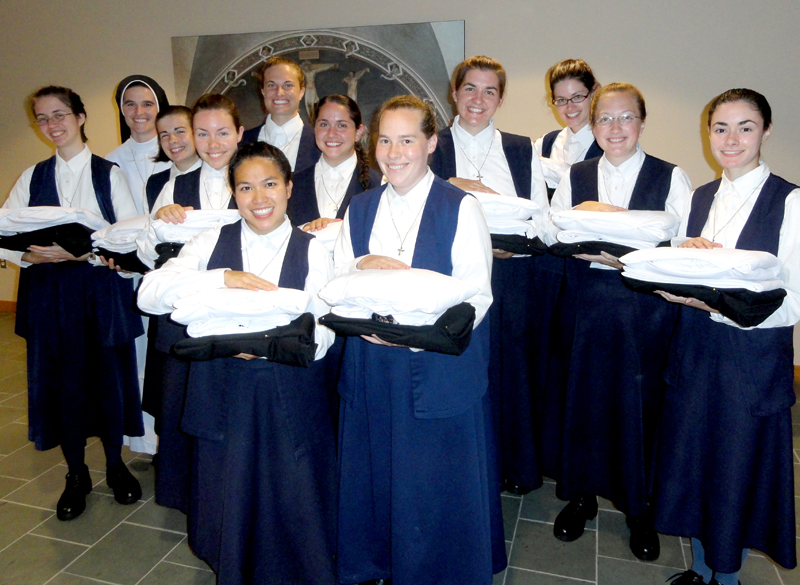Esther tells about how the Babylonian Haman was hanged on the gallows which he built for Mordecai, a Jew. But yesterday I was reading this passage in the New Living Translation, and it had Haman being impaled on a 75-foot stake he built for Mordecai. I looked it up in my NIV Study Bible, and a note said the word for gallows was actually something like “tree,” so it could have been a stake, and said impaling was a common punishment in that part of the world. The NLT went fully with that interpretation. It was a new, albeit gruesome, twist on a familiar story. Are you not now edified?
Marines vs. the Sisters of Mary

Joe Leatherman, drummer extraordinaire, soon-to-be Marine.
Joe Leatherman, the drummer for Anchor’s worship team for the past several years, left for San Diego on Sunday, March 4. He enlisted in the Marines last summer, and now it was time to head off to boot camp. I imagine that right about now, he’s not having a particularly fun time. Tired and hungry and yelled at. But it’ll be a life-changing experience for Joe. He’ll do great.
Several months ago, I asked Joe, “Why did you pick the Marines, as opposed to another branch?”
He said, “Because they’re the best.”
Anchor gave up its best young man for the Marines. It’s fitting, and we’re very proud.
Yesterday, I was researching the Sisters of Mary, a Dominican order of nuns founded just 15 years ago. A United Brethren church here in Huntington, Ind., where I work, bought the local St. Felix Friary back in 1980, and that was their church building for 20 years. But they decided to move out a couple years ago, and a foundation run by a Catholic businessman bought the monastery. He poured over $1 million into renovating it. I wrote about it on our denominational news site.
And now, the Sisters of Mary, Mother of the Eucharist, will be locating 40 novices there.
To become a nun in the Sisters of Mary, you go through an eight-year process before saying your vows. During that time, you earn a degree in education (if you don’t already have one), because the Sisters of Mary focus on teaching. They go all over the country teaching in Catholic schools, and they are in demand. But they are also committed to evangelism, to proclaiming Christ wherever are.
On their website, I read the testimonies of 14 nuns. It was very moving. They told about their spiritual journey, using much the same lingo that an evangelical would use–God’s call on their life, a personal relationship with Jesus, wanting to be totally committed to his will, giving yourself completely to Christ, etc. These women have a true heart for God.
In taking their vows, they commit themselves to povery, chastity, and obedience. These are quality people–most of them just young women–and they have totally sold out to their Savior. No distractions. No men, no material pursuits, no ambitions beyond what Christ wants for them.
When Joe Leatherman headed off to bootcamp, he took practically nothing with him–just the clothes he was wearing, and the hair on his head, which the Marines would soon take away. For six weeks, he would be forced into poverty, chastity, and obedience. Those weeks would train him to be a great soldier, the best, a killing machine. But just six weeks.
Then here are these Sisters of Mary. Eight years of preparation. A life of single-minded, total devotion to God. These are the people teaching young children in schools across the country.
If I’m in a scrape, I’d like a Marine beside me. Joe.
But when it comes to lots of things that really matter, I think these nuns are probably a whole lot tougher.
Moses: a Tale of Two Ascents
 I read Exodus 19 the other night, and found something curious.
I read Exodus 19 the other night, and found something curious.
Just before God gave Moses the 10 Commandments on Mount Sinai, he told Moses to make sure the people stayed back from the mountain. God didn’t want them even touching the foot of the mountain.
Then God told Moses to come to the top of Mount Sinai. We’re talking 7500 feet, a mile-and-a-half straight up, but many many miles of hard walking to get to the top. Moses went.
When Moses gets there, still huffing and puffing from the climb, God says, “Go back down and tell the people to keep their distance from the mountain.”
Huh?
“I already did that,” Moses said. “We put limits on how close they could come.”
But God said, basically, “Go down and tell them again.”
You can imagine Moses being exasperated. “But I’m an old man. Do you realize how hard it was for me to get to the top of this doggone mountain? It took me days to get here.”
“I know,” says God. “But that’s what I’m telling you to do.”
“Can’t you tell them yourself? Aaron’s down there. Tell him to pass along the message.”
“No, Moses, I want you to go tell them personally. Tell the people to stay back, and then right away come back to the top of the mountain. I’ll be here waiting. And this time, why don’t you bring Aaron with you.”
The chapter concludes, “So Moses went down to the people and told them.” And chapter 20 says that while Moses was receiving the tablets, “The people remained at a distance.”
Of course, they were also making a Golden Calf. Maybe Moses should have added, “And while I’m gone, don’t go making no idols. I’m just sayin’.”
1 CommentMusings about the Joseph Story
 I’m doing the One Year Bible readings (works great on my Nook), and am just finishing Genesis.
I’m doing the One Year Bible readings (works great on my Nook), and am just finishing Genesis.
We’ve all heard countless sermons about Joseph’s miraculous rise to the Number Two spot in Egypt. But I’ve never heard a sermon from Genesis 47, which tells how he carried out his job during the famine years.
By this time, his family has settled in Egypt, in the land of Goshen–the best land in Egypt. I imagine other families were expelled from Goshen to make room for Jacob’s clan and all their herds. That probably made some people mad, people capable of holding multi-generational grudges (not unlike today’s Palestinians).
(By the way–I wonder if Joseph and the brothers ever told Jacob what had really happened. About Joseph being sold into slavery, rather than being killed by an animal. I’ll bet they agreed, “Hey, Dad’s an old man. He can’t handle hearing this,” and that Jacob never learned the true story.)
Anyway, when the 7 years of famine struck (after the 7 good years), Joseph had enough food stored up to feed the Egyptian people. But he didn’t just give it away. No, he made them pay for it. Even though they had already grown it.
First, Joseph took their money, until they didn’t have any more to give. Then he took their livestock as payment, until, as the Bible says, Pharoah owned all the horses, sheep, donkeys, goats, and cattle in the land. When they had no more livestock to trade for food, he took their land. The people, understandably, freely gave up everything to get food. When they had no more assets to give, they gave themselves as slaves.
In the end, Joseph had pretty much nationalized the whole Egyptian economy. He controlled the food supply, owned every piece of land, owned all the livestock, and owned the very people as slaves. Everything now belonged to Pharoah. And Joseph had made it happen.
Throughout this, God’s direction is never mentioned, nor did Joseph give glory to God in any way. The reason, I’m sure, is that God didn’t want anythng to do with it. That’s not the way God wants people to govern.
Again, I’ve never, not once, heard a sermon even mention this. Kind of hard to explain to kids, how this is the same guy with the Amazing Technicolor Dreamcoat.
But consider Joseph’s dilemma. With his family in the land, Joseph lost much of his own freedom. He couldn’t act out of principle. Not anymore. Because if he displeased Pharoah in any way, not only might his own life be forfeit (like that poor baker’s), but so might the lives of all of his family. He had to protect them, and that meant doing whatever it took to appease Pharoah.
I imagine this weighed heavily on Joseph. He knew that, when he was out of the picture, his family–whom he had brought to Egypt, and sheltered, and provided for–would be in grave danger. That’s why he talked to them about returning to Canaan once he was gone.
Exodus tell us that a king “who knew not Joseph” came to power. Maybe some of this king’s friends or relatives were among those former Goshen-dwellers whom the Israelites displaced, and they wanted revenge. Exodus 1 says enemies engaged in fear-mongering about these immigrants, saying they were becoming too numerous and might help overtake the country (sounds like Americans talking about Hispanic or Muslim immigrants). And fear worked. Whereas the whole rest of Egypt had been enslaved under Joseph, now the Jews–Joseph’s people–became slaves. Payback.
Just some interesting musing about the potential backstory.
3 CommentsSometimes We Can Be Too Relevant
 I occasionally feel bothered by our efforts, as the Christian church, to adopt the world’s ways in order to appeal to the world. There are lots of advantages to doing that, and yet, I don’t know, it sometimes just doesn’t feel right. Maybe I’m just getting old and allergic to edgy.
I occasionally feel bothered by our efforts, as the Christian church, to adopt the world’s ways in order to appeal to the world. There are lots of advantages to doing that, and yet, I don’t know, it sometimes just doesn’t feel right. Maybe I’m just getting old and allergic to edgy.
Then along comes Chuck Swindoll, interviewed in a recent issue of Leadership Journal. Last fall Pam and I attended his church, Stonebriar Community Church, located in the Dallas suburb of Frisco. It was a very traditional service, with an orchestra and choir and hymns. In many ways, the service didn’t really appeal to me, probably because it’s been so long since I’ve regularly attended a non-contemporary church. But Swindoll’s sermon was superb. And really, isn’t that where the emphasis should be–on delivering a really great meal for hungry parishioners? As opposed to spending numerous man-hours putting together videos and dramas and light-shows and kick-butt music?
We were told, by someone who got a back-stage tour of Stonebriar, that they have all the best audio-visual equipment, including big screens on side walls on which they could project a larger-than-life Swindoll while he’s preaching. But he doesn’t let them do that. He wants people looking at him, rather than to the side walls. That’s not an ego thing–it’s not like he wants the attention. It’s a communication thing, of him directly engaging with his listeners eye-to-eye.
But back to the “being relevant” issue. We’ve all heard cautions that, when the church adopts the world’s methods, we lose our distinctiveness. On the other hand, being distinctively different from the world may make us seem out-of-touch, dated…irrelevant. So I’m a bit torn. No sense glorying in our distinctiveness when the pews are empty and the people in the homes surrounding our church are going to hell. And yet….
In the Leadership Journal interview, Swindoll had the following to say, and it’s good, thought-provoking stuff:
We’re tempted to think of the church as a business with a cross stuck on top (if it has a cross at all). “We really shouldn’t look like a church.” I’ve heard that so much I want to vomit. “Why?” I ask. “Do you want your bank to look like a bank? Do you want your doctor’s office to look like a doctor’s office, or would you prefer your doctor to dress like a clown? Would you be comfortable if your attorney dressed like a surfer and showed movies in his office? Then why do you want your church’s worship center to look like a talk show set?”
Martyn Lloyd-Jones said, “When the church is absolutely different from the world, she invariably attracts it. It is then that the world is made to listen to her message, though it may hate it at first.”
Some time ago a group of church leaders decided that they didn’t want to be hated. They focused just on attracting more and more people.
But if we’re here to offer something the world can’t provide, why would I want to copy the world? There is plenty of television. There are plenty of talk shows. There are plenty of comedians. But there is not plenty of worship of the true and living God.
A Different View of the Early Church
One of the blogs I follow is Larry Osborne Live. Osborne is a pastor in Florida who wrote “A Contrarian’s Guide to Spiritual Growth.” That book takes a new look at some of the assumptions we Christians have about God and the Christian life. It stretched me.
He recently wrote a post called, “Why I’m Pumped about the Future of the American Church.” He begins, “It’s fashionable to decry the current state of Christianity in America. But frankly, I don’t buy it. Some of the most popular conference speakers on the circuit today excel at drive-by guiltings. They paint a picture of a church that lacks guts, cowers from dying to self, and lives out a self-satisfied, what’s-in-it-for-me Christianity….But I just don’t agree on this issue.”
Yes, it’s easy to be negative, to lambaste Christians and the contemporary church for being weak, ineffective, blah blah blah. Why do we so enjoy self-flagellation? Does it really serve a purpose? Does it rally the troops in some way? Not that we need to always feel good about ourselves and reinforce our fragile self-esteem. But come on, we’re not always a bunch of losers.
Anyway, Osborne then talks about the early church of Acts, which we tend to idolize and treat as a model for today. But his observations are not so Utopian. Some excellent observations.
I’ve felt the same way, basically. I don’t view what happened in Acts as a model for all of us to follow, but mostly as a record of what happened. Just because the early Christians did things a certain, that doesn’t mean we’re supposed to. They were making it up as they went, trying to figure out this whole New Covenant thing and what it meant in terms of church life and behavior. In Acts, Luke tells what they did. It’s not supposed to be a blueprint for everyone to follow until Christ returns.
That’s my view, anyway. I in no way want to lessen the authority of God’s Word. But sometimes we give authority where it doesn’t belong, where the purpose was more history than teaching. Call me a heretic.







